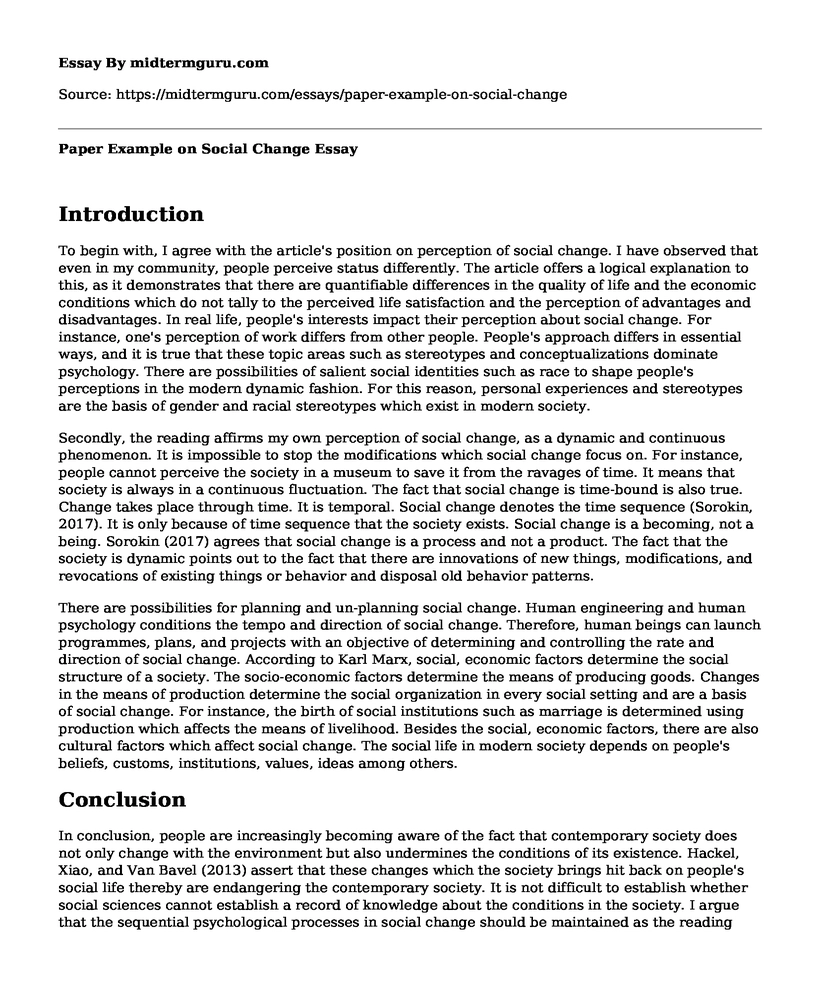Introduction
To begin with, I agree with the article's position on perception of social change. I have observed that even in my community, people perceive status differently. The article offers a logical explanation to this, as it demonstrates that there are quantifiable differences in the quality of life and the economic conditions which do not tally to the perceived life satisfaction and the perception of advantages and disadvantages. In real life, people's interests impact their perception about social change. For instance, one's perception of work differs from other people. People's approach differs in essential ways, and it is true that these topic areas such as stereotypes and conceptualizations dominate psychology. There are possibilities of salient social identities such as race to shape people's perceptions in the modern dynamic fashion. For this reason, personal experiences and stereotypes are the basis of gender and racial stereotypes which exist in modern society.
Secondly, the reading affirms my own perception of social change, as a dynamic and continuous phenomenon. It is impossible to stop the modifications which social change focus on. For instance, people cannot perceive the society in a museum to save it from the ravages of time. It means that society is always in a continuous fluctuation. The fact that social change is time-bound is also true. Change takes place through time. It is temporal. Social change denotes the time sequence (Sorokin, 2017). It is only because of time sequence that the society exists. Social change is a becoming, not a being. Sorokin (2017) agrees that social change is a process and not a product. The fact that the society is dynamic points out to the fact that there are innovations of new things, modifications, and revocations of existing things or behavior and disposal old behavior patterns.
There are possibilities for planning and un-planning social change. Human engineering and human psychology conditions the tempo and direction of social change. Therefore, human beings can launch programmes, plans, and projects with an objective of determining and controlling the rate and direction of social change. According to Karl Marx, social, economic factors determine the social structure of a society. The socio-economic factors determine the means of producing goods. Changes in the means of production determine the social organization in every social setting and are a basis of social change. For instance, the birth of social institutions such as marriage is determined using production which affects the means of livelihood. Besides the social, economic factors, there are also cultural factors which affect social change. The social life in modern society depends on people's beliefs, customs, institutions, values, ideas among others.
Conclusion
In conclusion, people are increasingly becoming aware of the fact that contemporary society does not only change with the environment but also undermines the conditions of its existence. Hackel, Xiao, and Van Bavel (2013) assert that these changes which the society brings hit back on people's social life thereby are endangering the contemporary society. It is not difficult to establish whether social sciences cannot establish a record of knowledge about the conditions in the society. I argue that the sequential psychological processes in social change should be maintained as the reading suggests. It is imperative for people to be aware of their perceptions since it is a key component of success in society. I, therefore, agree that there are psychological processes which accompany social change when people call for its dynamic investigation and understanding.
References
Hackel, L. M., Xiao, Y. J., & Van Bavel, J. J. (2013). Social identity shapes social perception and evaluation: Using neuroimaging to look inside the social brain. In Neuroscience of Prejudice and Intergroup Relations (pp. 120-139). Psychology Press.
Sorokin, P. (2017). Social and cultural dynamics: A study of change in major systems of art, truth, ethics, law and social relationships. Routledge.
Cite this page
Paper Example on Social Change. (2022, Sep 26). Retrieved from https://midtermguru.com/essays/paper-example-on-social-change
If you are the original author of this essay and no longer wish to have it published on the midtermguru.com website, please click below to request its removal:
- How to Navigate the Relationship - Essay Sample
- The Development of Buddhism and Its Influence on Vietnamese Society Throughout History
- Do Treatment of Prisoners Matter in Society? - Essay Sample
- The Changing Dynamics of Business: Globalization, Society & Regulation - Essay Sample
- Research Paper on Social Change: A Collaborative Effort Through Action Research
- Literary Analysis Essay on "A Doll's House"
- Exploring Demographics in Carrollwood, Florida, USA - Essay Sample







